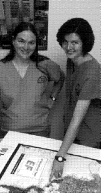

|
Nursing without a net |

Nursing professor Wendy Neander (left) and student Tara Coupland |
"We were in a makeshift clinic set up in an office in a Guatemalan village. A mother and father arrived in the evening carrying their small daughter who was severely dehydrated. The child was obviously too ill to be taken to the hospital which was a further two hour journey over a bumpy road, dangerous in the dark. So we took her in and started to re-hydrate her. She was unable to drink from a cup or suck on a bottle. So while she lay on blankets on a desk, our students in shifts spent the entire night feeding her re-hydration solution through a syringe."
Nursing professor Wendy Neander recalls the event vividly. It was a challenging situation for her and a group of 12 fourth-year U of A nursing students. But it was typical of health-care problems in remote areas of developing countries. Without laboratory facilities to help in diagnosis and treatment, the observation of physical symptoms becomes critical. Students learn to be more resourceful and to think of alternatives when sophisticated equipment is not at hand. It's a tremendous learning experience, says Neander.

Student Tara-Lee Hayden checks blood pressure |
Fortunately the child, Maria Carolina, responded and after 48 hours could be taken home. Her father insisted on showing his gratitude with a small payment. And the following week, her mother made the long trek back to the clinic to again offer profuse thanks.
Neander has been taking groups of students to Guatemala for a six-week summer nursing practicum since 1992. The practicum provides experience in different locales -- large urban Guatemala City, a remote highland Mayan community, a tourist area and a coastal farming community. We want to give students an idea of how geography and climate affect people's health and their lives, says Neander.

Tiny Maria Carolina in a makeshift Guatemala medical station |
For Tara Coupland, a 1998 nursing graduate, the practicum was her first experience in outreach work. "It was hard seeing the poverty, and accepting that people have to live that way," she says. "But at the same time, I learned a lot from them. They go to great lengths to help each other. People carry their neighbors miles to the clinic simply because there is no one else to help."
The students work long hours, six days a week at the clinics assessing patients with conditions such as respiratory problems, gastrointestinal complaints, and headaches, or working in health education and disease prevention. Much of their work focuses on the health of women and children. The cervical cancer rate in the country is very high, so they frequently do gynecological exams.
There are 22 different aboriginal languages in the country and 80 per cent of women are illiterate, so personal contact is important in health education. During an outbreak of whooping cough in the highlands, the students trekked door to door with interpreters to convince people to immunize their children. "Seeing people living in one room with no ventilation and knowing they don't have refrigeration, or enough wood to boil water, made us think about alternative ways to maintain health," says Coupland.
The program has proven valuable in developing sensitivity and compassion in the students, says Neander, and it helps them recognize that people have to use whatever they have in a community to take control of their own health care. These are important skills for any kind of nursing, she says, and are transferable to similar communities in Canada.
The biggest change Neander has observed since 1990 when she began working in Guatemala is that there are now trained people to look after health issues in their own communities. And the Mayan people as a group are regaining pride in their ability to care for themselves, and in their own health knowledge. (The U of A also supports research in some Guatemalan universities about the medicinal value of local plants.)
Neander knows from personal experience the benefits of working in a different cultural setting. After receiving her master's degree in nursing from the University of Alberta in 1987, she worked as a nurse in Northern Canada and in a Mayan community in Guatemala. She developed the practicum program through contacts made during those years. "These experiences add a lot of meaning to my life."
The U of A Nursing contingent is supported by other groups both inside and outside Guatemala. Alberta's Wild Rose Foundation assists by providing funds to train local people as health promoters. And the nurses work closely with the Pueblo Partisans, a Canadian non-governmental organization that has developed some long-term programs in Guatemala to combat illiteracy and improve agriculture, both of which have considerable impact on health.
![[Folio]](http://www.ualberta.ca/~publicas/folio/gif/small/folio.gif)
Folio front page |
![[Office of Public Affairs]](http://www.ualberta.ca/~publicas/gif/small/opahome.gif)
Office of Public Affairs |
![[University of Alberta]](http://www.ualberta.ca/~publicas/gif/small/uahome.gif)
University of Alberta |